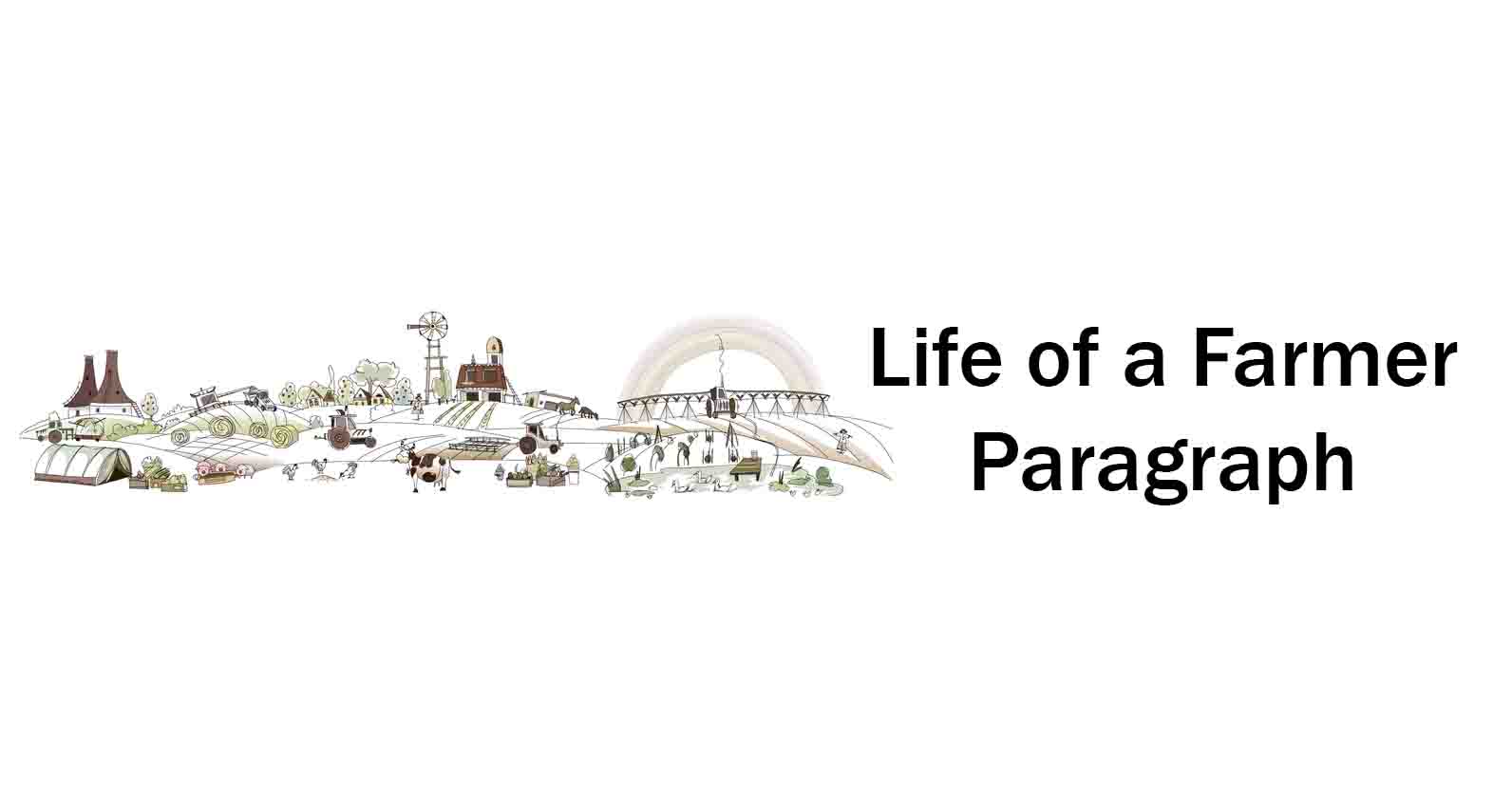Life of a Farmer Paragraph for hsc, ssc and Any Exam

The life of a farmer involves a great deal of hard work and responsibility. Farmers are responsible for producing the food that sustains communities and the world. This requires a deep understanding of agriculture, including soil composition, weather patterns, and pest control. The physical demands of farming can be grueling, often requiring long hours in the fields. In addition to their fieldwork, farmers must also manage finances, maintain equipment, and keep detailed records. They must have a good understanding of business and be able to make tough decisions about investments, expenses, and crop selection. Farming is also a risky business, as it is often impacted by weather events and market fluctuations, so farmers must be adaptable and resilient. Despite the challenges, the life of a farmer can be incredibly fulfilling. The satisfaction of a bountiful harvest, the chance to work outdoors and be close to nature, and the opportunity to pass on their knowledge and skills to future generations are just a few of the rewards of this profession. The bond with the land and the passion for agriculture are integral to a farmer’s life. The life of a farmer is a challenging but fulfilling one. Farmers play a critical role in producing the food we eat and sustaining our communities. They must be knowledgeable, hardworking, and adaptable to succeed in this noble profession.
Life of a Farmer Paragraph for HSC
The life of a farmer can be both rewarding and challenging. Farmers are responsible for producing the food that feeds our communities and the world. They work long hours, often from sunrise to sunset, to care for their crops and livestock. Their work is physically demanding and requires a great deal of patience and perseverance. Farming is a lifestyle that requires a deep connection to the land and a passion for agriculture. Farmers must have an understanding of soil composition, weather patterns, and pest control to be successful. They must also have excellent business and management skills to keep their farm financially viable. This often involves making tough decisions about investments, expenses, and crop selection. The work of a farmer is not just limited to the fields. They also must keep detailed records, handle equipment maintenance and repairs, and manage the financial aspect of their operation. They must be able to adapt to the changing market conditions and be ready to respond to weather events that can impact their crops and livestock. Despite the challenges, the life of a farmer can be incredibly rewarding. Farmers have the satisfaction of seeing their hard work come to fruition in the form of a bountiful harvest. They also have the opportunity to work outdoors and be close to nature. They can pass on their knowledge and skills to future generations and leave a lasting impact on their community. The life of a farmer is a challenging but fulfilling one. Farmers play a critical role in producing the food we eat and sustaining our communities. They must be knowledgeable, hardworking, and adaptable to succeed. Despite the difficulties, the reward of a life well-lived on the farm is immeasurable.
Life of a Farmer Paragraph for SSC
The life of a farmer is a mixture of hard work and satisfaction. Farmers are responsible for growing the food that nourishes communities and the world. They must be knowledgeable in soil composition, weather patterns, and pest control to be successful. The physical demands of farming can be exhausting, requiring long hours, sometimes from sunrise to sunset. In addition to their fieldwork, farmers must also manage finances, maintain equipment, and keep records. Despite the challenges, the life of a farmer can be incredibly fulfilling. The satisfaction of a bountiful harvest, the chance to work outdoors and be close to nature, and the opportunity to pass on their knowledge and skills to future generations make farming a worthwhile profession. The bond with the land, the understanding of agriculture, and the passion for the job are integral aspects of a farmer’s life. However, farming can also be a risky business, as it is often impacted by weather events and market fluctuations. To mitigate these risks, farmers must possess excellent business and management skills and be able to adapt to changing conditions. This requires a level of resilience and determination that is not easily found in other professions. The life of a farmer is not an easy one, but it is a fulfilling and critical profession. Farmers are essential to producing the food we eat and sustaining our communities. They must be knowledgeable, hardworking, and adaptable to succeed in this challenging but rewarding career.
Key Points for Life of a Farmer Paragraph
1. What does a farmer do?
A farmer is responsible for cultivating crops, raising livestock, and managing land for agricultural purposes. They typically work long hours and are responsible for all aspects of farming, including planting, harvesting, and marketing their products.
2. What are some challenges faced by farmers?
Farmers face a range of challenges, including unpredictable weather, pests and diseases, market fluctuations, and changing regulations. They also often face financial pressures and must manage their farms in a sustainable and environmentally responsible manner.
3. What is sustainable agriculture?
Sustainable agriculture is an approach to farming that emphasizes environmental stewardship, economic viability, and social responsibility. It involves using practices that promote soil health, conserve natural resources, and reduce the use of pesticides and other chemicals.
4. How has technology changed farming?
Technology has had a significant impact on farming, from advances in agricultural machinery to precision farming techniques that use sensors and data analysis to optimize crop yields. It has also enabled farmers to better manage their resources and reduce their environmental impact.
5. What is the role of agriculture in the economy?
Agriculture plays an important role in the global economy, providing food and other products that are essential for human survival. It also supports millions of jobs worldwide and contributes to economic growth and development in many countries.
6. How has climate change affected farming?
Climate change has had a significant impact on farming, including changes in precipitation patterns, rising temperatures, and extreme weather events such as droughts and floods. This has made farming more challenging and unpredictable and has led to increased pressure to adopt sustainable practices that can help mitigate the effects of climate change.
7. What are some of the benefits of supporting local farmers?
Supporting local farmers can help promote sustainable agriculture, reduce the carbon footprint associated with transportation, and strengthen local economies by creating jobs and keeping money in the community. It also provides consumers with fresher and healthier food options.









